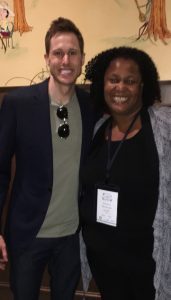This blog comes the day after Thanksgiving, and that is not coincidental. I visited my elderly grandparents for the holiday and for the most part just really loved getting caught up with their life happenings.
Grandma & Grandpa Cecile know where I work and what I do. I’ve done the same for the past 15 years, and darn-it they have been avoiding coming to visit me to see the Audiologists for equally as long.
This year was no different. Except that Meme was complaining of an incessant ringing in her ears that started two months ago. Ringing that is high pitched and distracting. So distracting that she visited her family physician twice. Twice she was told that nothing could be done, and to leave a radio on when she tries to sleep. She was telling me this while I nodded my head and waited for her to finish telling me how her ringing in her ears keeps her from painting and doing her word search puzzles.
When I softly commented that if there was a simple fix to the ringing in her ears, would she do it? Yes? Well, then perhaps she should make an appointment to see the Audiologist at The Hearing & Dizziness Clinic. Then the excuses began.
I wish I had a tape recorder on me, because this list would be more than a “Top 5”.
1. I can hear a pin drop. This is for all of those who use this excuse (or it’s close relative the ‘I don’t have a problem with my hearing, I hear everything’.) While it’s true that you may in fact hear pins drop, that is but ONE frequency of sound. Without a hearing test for the last 40 years, how do you know that you are hearing everything?
2. My mother lived to be 95 and never needed a hearing aid. Needing vs. wanting a hearing aid are two very different things. (I knew Granny Sweetie at 95. She needed a hearing aid. She may not have wanted one, but she certainly needed one.) Regardless of need vs. want, this excuse is made moot by the fact that you and your mother did not have the same experiences in life that may have damaged hearing. While yes, genetics can play a factor in hearing loss, generally inherited hearing loss is present in newborns.
3. It’s just the two of us and I don’t need to hear him. Well there you have it. Argument finished. There couldn’t possibly be anything else to listen to in your life other than Grandpa. The kettle boiling, the doorbell, the garage door malfunctioning (as it did last year, which they didn’t realize until I visited), an intruder breaking in, mice in the walls in the kitchen, the muffler going on the minivan, the banker you yelled at last week for not telling you something that he obviously had etc. Yup. Nothing more to hear in life, just throw in the towel.
4. My Doctor told me there was nothing that could be done (or another personal favorite the “I have the kind of hearing loss that can’t be helped.”) This one irks me because no well rounded physician would tell a patient this. Liken it to going to the doctor and telling them that you can’t see. I’m fairly 100% sure that almost every physician in the universe would suggest seeing an Optometrist for starters, among other things. Don’t use your Doctor as your excuse. He or she wants you to be well and to have your hearing tested regularly. Trust me.
5. I just can’t be bothered with all that hassle. Oh yes. The hassle. The hassle of having a hearing test and learning to use a hearing aid. Changing it’s battery every 7-10 days. Wait, you have an appointment with the eye doctor for a vision test? An appointment at the foot clinic? What about that hassle? Life is nothing but hassles. It’s only a hassle if it has no perceived value to you. Which apparently improved communication and safety does not.
So there you have it. If you’ve ever used these 5 excuses, just know – like my Grandma – I’m on to you! Your excuses are your way of rationalizing your refusal to take a simple hearing test. It’s a defense mechanism used to justify and explain in a seemingly logical manner (to you) your avoidance of the truth: You just don’t want hearing aids. For whatever reason. They’re pricey. They’re ugly. People will know you’re old. Despite the fact that they may be able to help you rid yourself of that annoying ringing in your ears that has changed your life…it’s just a hassle.
I may never win over my grandmother – until she’s good and ready to come in (she’s just as stubborn as I am!) but that doesn’t mean I’m going to stop trying.
Give up the ghost. It’s just a hearing test. At least that way when you tell people that there’s nothing wrong with your hearing, you will at least know to cross your fingers!
~melissa
 We’re please to announce that Bernice McKenzie is part of the DrCliffAud Approved Provider Network!!
We’re please to announce that Bernice McKenzie is part of the DrCliffAud Approved Provider Network!!
